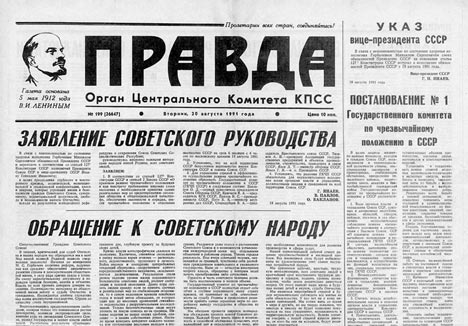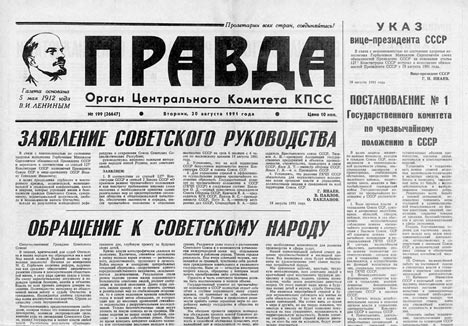
The heroes of Dickens’ Pickwick Papers visit the fictional borough of Eatanswill to observe an election between the candidates of the Blue Party and the Buff Party. The town is passionately divided, on all possible issues, between the two parties. Each party has its own newspaper: the Eatanswill Gazette is Blue and entirely devoted to praising the noble Blues and excoriating the perfidious and wicked Buffs; the Eatanswill Independent is equally passionate on the opposite side of every question. No Buff would dream of reading the “that vile and slanderous calumniator, the Gazette”, nor Blue the ”that false and scurrilous print, the Independent”.
As usual with Dickens it is both exaggerated and accurate. Newspapers used to be screamingly partisan before “journalism” was invented. Soon followed journalism schools, journalism ethics and journalism objectivity: “real journalism” as they like to call it (RT isn’t of course). “Journalism” became a profession gilded with academical folderol; no longer the refuge of dropouts, boozers, failures, budding novelists and magnates like Lord Copper who know what they want and pay for it. But, despite the pretence of objectivity and standards, there were still Lord Coppers and a lot of Eatanswill. Nonetheless, there were more or less serious efforts to get the facts and balance the story. And Lord Coppers came and went: great newspaper empires rose and fell and there was actually quite a variety of ownership and news outlets. There was sufficient variance that a reader, who was neither Blue nor Buff, could triangulate and form a sense of what was going on.
In the Soviet Union news was controlled; there was no “free press”; there was one owner and the flavours were only slightly varied: the army paper, the party paper, the government paper, papers for people interested in literature or sports. But they all said the same thing about the big subjects. The two principal newspapers were Pravda (“truth”) and Izvestiya (“news”). This swiftly led to the joke that there was no truth in Pravda and no news in Izvestiya. It was all pretty heavy handed stuff: lots of fat capitalists in top hats and money bags; Uncle Sam’s clothing dripping with bombs; no problems over here, nothing but problems over there. And it wasn’t very successful propaganda: most of their audience came to believe that the Soviet media was lying both about the USSR and about the West.
But time moves on and while thirty years ago 50 corporations controlled 90 percent of the US news media, today it’s a not very diverse six. As a result, on many subjects there is a monoview: has any Western news outlet reported, say, these ten true statements?
1) People in Crimea are pretty happy to be in Russia.
2) The US and its minions have given an enormous amount of weapons to jihadists.
3) Elections in Russia reflect popular opinion polling.
4) There really are a frightening number of well-armed nazis in Ukraine.
5) Assad is pretty popular in Syria.
6) The US and its minions smashed Raqqa to bits.
7) The official Skripal story makes very little sense.
8) Ukraine is much worse off, by any measurement, now than before Maidan.
9) Russia actually had several thousand troops in Crimea before Maidan.
10) There’s a documentary that exposes Browder that he keeps people from seeing.
I typed these out as they occurred to me. I could come up with another ten pretty easily. There’s some tiny coverage, far in the back pages, so that objectivity can be pretended, but most Western media consumers would answer they aren’t; didn’t; don’t; aren’t; isn’t; where?; does; not; what?; never heard of it.
Many subjects are covered in Western media outlets with a single voice. Every now and again there’s a scandal that reveals that “journalists” are richly rewarded for writing stories that fit. But after revelations, admissions of bias, pretending it never happened, the media ship calmly sails on (shedding passengers as it goes, though). Coverage of certain subjects are almost 100% false: Putin, Russia, Syria and Ukraine stand out. But much of the coverage of China and Iran also. Many things about Israel are not permitted. The Russia collusion story is (privately) admitted to be fake by an outlet that covers it non stop. Anything Trump is so heavily flavoured that it’s inedible. And it’s not getting any better: PC is shutting doors everywhere and the Russian-centred “fake news” meme is shutting more. Science is settled but genders are not and we must be vigilant against the “Russian disinformation war“. Every day brings us a step closer to a mono media of the One Correct Opinion. All for the Best Possible Motives, of course.
It’s all rather Soviet in fact.
So, in a world where the Integrity Initiative is spending our tax dollars (pounds actually) to make sure that we never have a doubleplusungood thought or are tempted into crimethink, (and maybe they created the entire Skripal story – more revelations by the minute), what are we to make of our Free Media™? Well, that all depends on what you’re interested in. If it’s sports (not Russian athletes – druggies every one unlike brave Western asthmatics) or “beach-ready bodies” (not Russian drug takers of course, only wholesome Americans) – the reporting is pretty reasonable. Weather reports, for example (Siberian blasts excepted) or movie reviews (but all those Russian villains). But the rest is some weird merger of the Eatonswill Gazette and Independent: Blues/Buffs good! others, especially Russians, bad!
So, as they say in Russia, что делать? What to do? Well, I suggest we learn from the Soviet experience. After all, most Soviet citizens were much more sceptical about their home media outlets than any of my neighbours, friends or relatives are about theirs.
My suggestions are three:
1) Read between the lines. A difficult art this and it needs to be learned and practised. Dissidents may be sending us hints from the bowels of Minitrue. For example, it’s impossible to imagine anyone seriously saying “How Putin’s Russia turned humour into a weapon“; it must have been written to subversively mock the official Russia panic. I have speculated elsewhere that the writers may have inserted clues that the “intelligence reports” on Russian interference were nonsense.
2) Notice what they’re not telling you. For example: remember when Aleppo was a huge story two years ago? But there’s nothing about it now. One should wonder why there isn’t; a quick search will find videos like this (oops! Russian! not real journalism!) here’s one from Euronews. Clearly none of this fits the “last hospitals destroyed” and brutal Assad memes of two years ago; that’s why the subject has disappeared from Western media outlets. It is always a good rule to wonder why the Biggest Story Ever suddenly disappears: that’s a strong clue it was a lie or nonsense.
3) Most of the time, you’d be correct to believe the opposite. Especially, when all the outlets are telling you the same thing. It’s always good to ask yourself cui bono: who’s getting what benefit out of making you believe something? It’s quite depressing how successful the big uniform lie is: even though the much-demonised Milosevic was eventually found innocent, even though Qaddafi was not “bombing his own people”, similar lies are believed about Assad and other Western enemies-of-the-moment. Believe the opposite unless there’s very good reason not to.
In the Cold War there was a notion going around that the Soviet and Western systems were converging and that they would meet in the middle, so to speak. Well, perhaps they did meet but kept on moving past each other. And so, the once reasonably free and varied Western media comes to resemble the controlled and uniform Soviet media and we in the West must start using Soviet methods to understand.
Always remember that the Soviet rulers claimed their media was free too; free from “fake news” that is.
Reprinted with permission from Strategic Culture Foundation.

